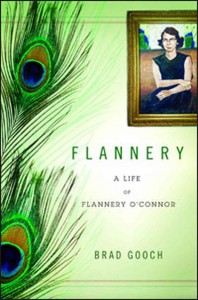This volume has provoked in this correspondent a number of Yogi Berra moments—it’s been déjà vu all over again, and for more than one reason. Why, then, am I seized with such a pleasant vertigo? Let me count the ways! First off, I have lived with this material before some of it even happened, for over 50 years, and I have known quite a few of the people who appear in these pages. Add to that the matter of biographical multiplication or proliferation or splintering, for in these pages in one way and another are Sally Fitzgerald, in whose household O’Connor once lived, and who later researched O’Connor’s life, wrote about her, and edited her essays and letters, and whose death in 2000 forestalled a biography that would have had unique insight; William Sessions, a scholar who as a young man knew O’Connor and who is now finishing his own biography of her; and Jean Cash, whose serviceable biography of O’Connor was the first to appear. So add Mr. Gooch himself and we have four biographers, three of whom consulted with me about the subject of this biography, and two of whom were notable, or even major, players within the overarching story of Flannery O’Connor herself.
Gooch’s is an exceptional rendering of that story on account of its agile and empathetic projection into scenes that are long gone: Savannah in the 30’s, Milledgeville and the Georgia State College for Women during World War II, Iowa later on, New York and Connecticut in the late 40’s, Andalusia, even Lourdes. On the whole, the account is very well done, readable and user friendly, for the story has been related shrewdly and intuitively and with a sense of the idiosyncrasies of individuals. The book is dynamic, dramatic, appealing, and successful, and it’s hard to say whether its virtues are the result of imagination or of sheer writerly accomplishment—or are these the same thing?
I have to add that such success comes at a certain price, for the better the execution, the more exposed the flaws. There are places in this book where it seems that the author’s left hand didn’t know what his right hand was doing, or, to put it another way, there are times when he sacrifices a hard–earned immersion in the late 40’s or the early 50’s to render incongruous contemporary attitudes. To put it yet another way, at one point the discourse is contradicted by its own footnote. In addressing the obscure kerfuffle at Yaddo that was occulted by the overwrought condition of Robert Lowell, the author refers to O’Connor’s “simple view of Communism as evil,” yet the note revealingly acknowledges Agnes Smedley’s culpability, according to Soviet files accessible decades later. Are the Soviet files themselves to be dismissed for their simple view of communism as evil? Does the simplicity of the view mean that communism was not—is not—evil?
Well, that was an easy one, or at least it was for me. But there are harder instances that are not treated any more satisfactorily. As for example: I think that a biographer of this writer is obliged to explain, rather than merely to acknowledge, the extent of Flannery O’Connor’s radicalism in addressing her environment. For instance, O’Connor more than once deprecated her own Irish heritage. She seemed to think that “the Church” trumped “Ireland,” though a little historical knowledge would have told her that, at one time, the Church was Ireland. I think it is bizarre that this writer would be so disinterested in familial cultural connections, or at least claim to be. In a similar gesture, Flannery O’Connor rejected the shabby-genteel mode of old Milledgeville and the matriarchal order behind the façades of those old Federal-style houses. She disclaimed any interest in the Civil War, though the secession of the state had been pronounced right where she was. She stated that her mind was antihistorical, though she had lived next door to the old governor’s mansion. Yet the geniality of the present exposition does not allow the force of such rejections to be felt.
And that geniality is a bit selective as well. I find it unacceptable to be told that the author of “The Artificial Nigger” and “Revelation” was a “racist,” even when this epithet is hedged by quotation from others. The absurd construction, “cultural racism,” doesn’t make things any better. Let me put it this way: The lists of Dramatis Personae preceding Shakespearean plays do not advocate but rather present hierarchies we need to know to understand the plays. Kings and clowns are not socially equal, yet their position may dramatically be reversed. The hierarchy at the literary (not the historical) O’Connor farm was useful to its author to get the imaginative job done, one which transcends other distinctions, for the Kingdom of Heaven is not of this world. I will add at this point that the gravediggers do not share the linguistic finish of Hamlet and Horatio, though they share a scene—and all share a cemetery. And add that O’Connor’s calibrated contempt seems to be aimed at white trash—and at muddle-crass whites as well. And add again that private jokes rendered in a Pogo-like baby talk do not “racism” constitute.
Brad Gooch has overestimated Faulkner’s influence on O’Connor, underestimated Hawthorne’s, neglected to cite the research of some scholars that he treats as though he had done the work himself, and scanted the scope of O’Connor’s reading. But he has produced a highly readable biography of a genius—one who wrote under the aspect of eternity and under the sentence of death.
[Flannery: A Life of Flannery O’Connor, by Brad Gooch (New York: Little, Brown & Co.) 416 pp., $30.00]

Leave a Reply